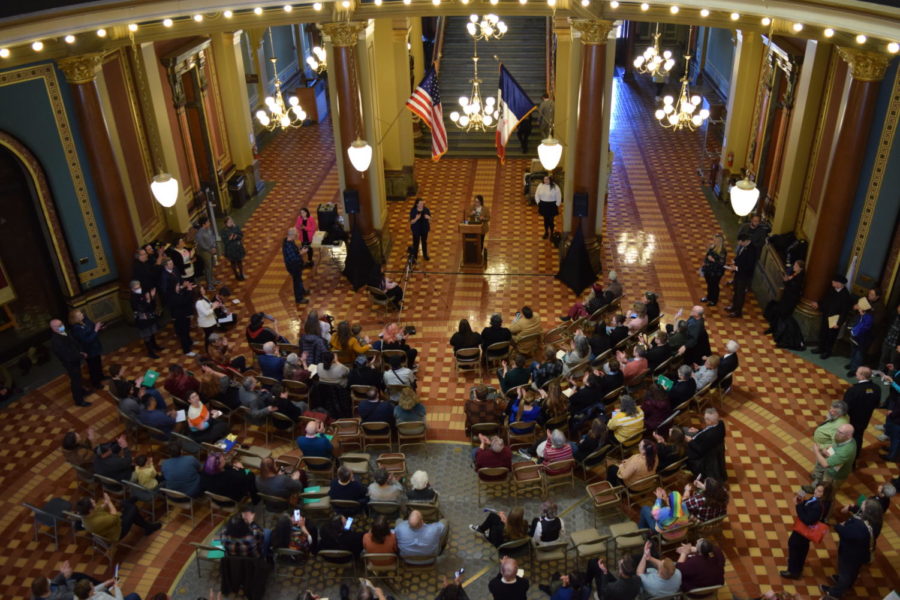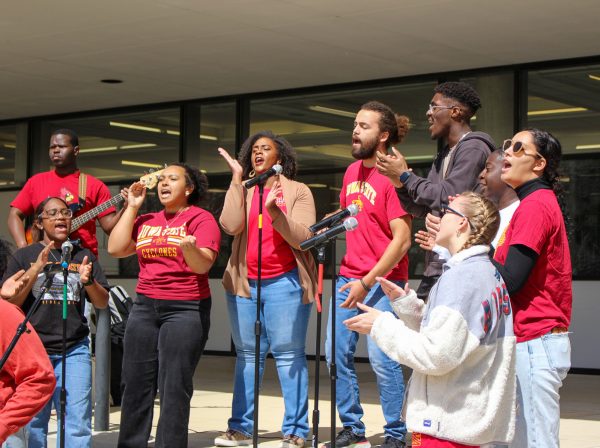Iowa State students share their take on gender identity legislation
Protestors gathered at Iowa Capitol for oneiowa LGBTQ Day On the Hill in face of bills restricting discussions of gender identity in schools.
Editor’s Note: Karen Kedrowski is speaking on behalf of herself and not Iowa State University.
At Iowa State, students use nicknames, chosen names and pronouns daily; however, for K-12 students in Iowa, bills proposed by Iowa House Republicans seek to restrict that freedom.
Multiple bills targeting LGBTQ+ students in K-12 have been introduced by Iowa House Republicans aiming to restrict lessons on gender identity and out students to their parents based on pronouns and name changes.
“These bills will have a negative impact on future generations and will affect children poorly,” Lauren Brown, a sophomore in interior design, said.
Brown said these bills will lead to uneducated people who will get a culture shock, and those who are a part of the gay or transgender community will become more hesitant to speak out.
“U.S. politics has been divided along the ‘culture wars’ for a half century,” Karen Kedrowski, director of the Carrie Chapman Catt Center, stated in an email. “Disputes over abortion, same sex marriage, family, employment rights, critical race theory and sodomy laws all predate these bills.”
Mimic laws of House File 8 and 9 passed in Florida that would restrict discussion of gender and sexuality in schools and keep these conversations between parents and their children.
Kedrowski stated recently, there has been controversy over trangender children’s medical care and ability to participate in sports. These issues have been spearheaded in Florida under Gov. Ron DeSantis, and these bills in Iowa are related to that.
Tessa Clark, a sophomore in biological systems engineering, said she originally had not heard about the bills and does not keep up with Ames or Iowa news. Mainly paying attention to campus news, Clark said she was “displeased and both sad and angry” to hear about the bills.
“The parents having to give a note gets rid of safe spaces and can be dangerous for students that aren’t out yet,” Clark said.
These bills, according to Clark, will create more internalized homophobia and transphobia along with higher suicide rates.
“These bills unfairly target a vulnerable population: young children who are dealing with the trauma of gender dysphoria and who may also face unsupportive families and bullying because of their gender identity,” Kedrowski stated.
Kewdrowski stated these bills add greater burden and have the potential to further trauma.
“Heterosexuality is forced upon kids from a young age whether they realize it or not, and the argument that if you talk about being gay you will become gay is false because we were already fed the opposing information all of our lives,” Clark said.
Clark said she believes the more conservatives in power, it is even more inevitable bills like these will continue to arise. Clark said bills that target LGBTQ+ individuals will make people more aware of what is going on and make people angry, leading to distrust in the political system
Caleb Spry is a junior in horticulture, and he said parents should have a say, and educators should reach out to parents to inquire but should not take away from students receiving a well-rounded education.
“When people are uneducated on certain topics, specifically with topics of gender, people don’t really know what to say, which can just make it overall more uncomfortable,” Spry said.
Liya Mooradian, a sophomore in genetics, is an attendee of QTPoC dinners. She said she knows people who frequently change their name, so the process at schools would be unnecessary.
“What would happen if a student with a long name wanted a nickname?” Mooradian said. “Would the parent have to write a form for that?”
Mooradian said these bills come about because people are stuck in their own ways and not ready to adapt to modern society, especially in Iowa. Smaller cities in Iowa are often conservative, while university cities and Des Moines are liberal. Mooradian said it is up to smaller communities to see the world for what it can be rather than what it is to them.
Kedrowski stated children will be deprived of the chance to learn tolerance and acceptance of difference; instead, negative stereotypes will continue to be pushed.
Spry and Mooradian said politicians need to realize they represent a large number of diverse people, not not just the group they affiliate with.
“I encourage people to listen to trans voices, educate yourself and interact with different people and just know that you are loved,” Clark said.
Your donation will support the student journalists of the Iowa State Daily. Your contribution will allow us to purchase equipment, send our student journalists to conferences and off-set their cost of living so they can continue to do best-in-the-nation work at the Iowa State Daily.

















